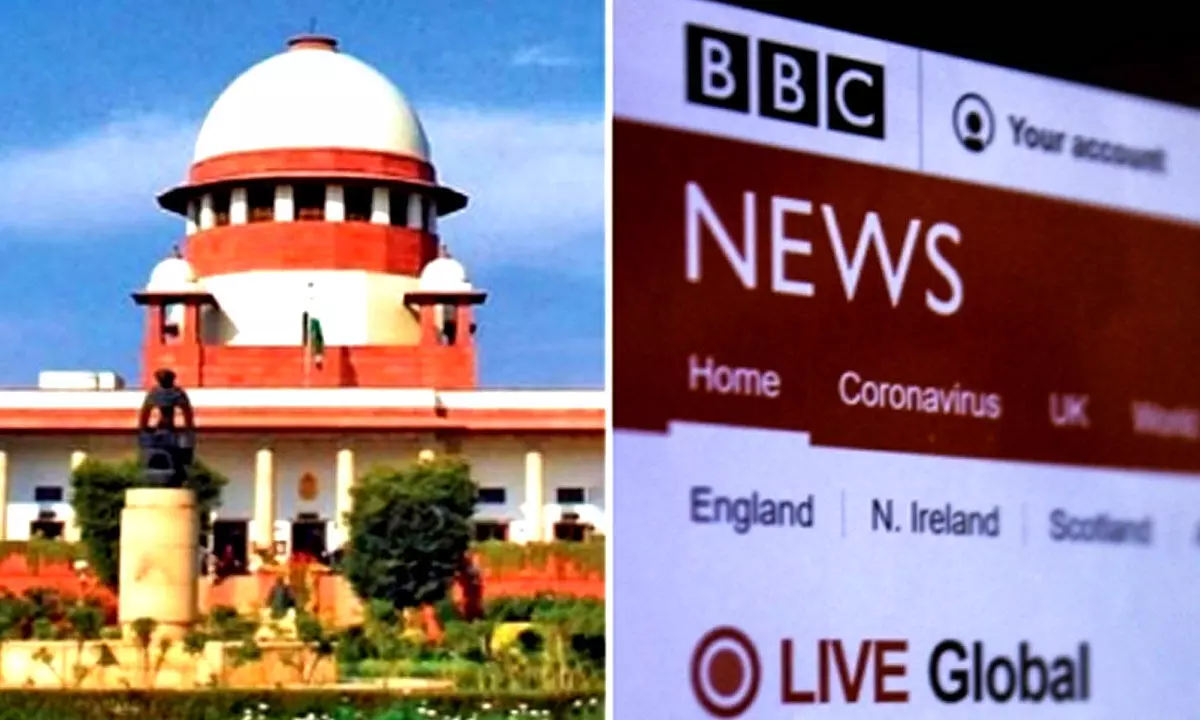Live
- All you need to know about PAN 2.0
- Akasa Air redefines travel experience with industry-first offerings
- MP: Residents stage protests against liquor shop in Indore
- Telugu Actor Shri Tej Booked for Alleged Cheating and False Promise of Marriage in Live-in Relationship
- Toyota Kirloskar Motor Celebrates 1 Lakh Urban Cruiser Hyryder on Indian Road
- MLS: New York City FC part ways with head coach Nick Cushing
- Delhi CM says Centre cutting AAP voters’ names from rolls, BJP hits back
- Hyderabad Metro Rail Phase-II Works to Begin in Old City in January 2025
- Odisha: 668 persons killed in human-elephant conflicts in last three years
- DEFENDER JOURNEYS: TO EMBARK ON ITS THIRD EDITION FROM NOVEMBER 2024
Just In
Supreme Court agrees to examine plea against ban on BBC documentary on Gujarat riots

Supreme Court agrees to examine plea against ban on BBC documentary on Gujarat riots
The Supreme Court on Monday agreed to examine, on February 6, a plea challenging the Centre's ban on the BBC documentary in connection with the 2002 Gujarat Riots.
New Delhi: The Supreme Court on Monday agreed to examine, on February 6, a plea challenging the Centre's ban on the BBC documentary in connection with the 2002 Gujarat Riots.
Advocate M.L. Sharma mentioned the plea for urgent listing before a bench headed by Chief Justice of India D.Y. Chandrachud, and the top court agreed to hear it on February 6.
The series, titled "India: The Modi Question", has been dismissed as a biased "propaganda piece" by the government.
The plea, filed by Sharma, contended that the BBC documentary and was released for public view, however due to fear of truth, the documentary has been banned from viewership in India by any means under Rule 16 of IT Act 2021.
Sharma's plea sought a direction for quashing of the January 21 order under the IT Act being illegal, malafide and arbitrary, unconstitutional and void ab-initio and ultra vires to the Constitution.
The documentary titled 'India: The Modi Question' has been banned on social media and online channels, but some students have screened it on campuses of various universities across the country.
Sharma's plea contended that the BBC documentary has reflected true facts with original recording of the victims of 2002 riots as well as others concerned involved in the scenario of riots, and it can be used for judicial justice.
The top court will also hear next week, a separate petition filed by journalist N. Ram, Trinamool Congress MP Mahua Moitra, and advocate Prashant Bhushan on taking down their tweets with links of the documentary.
"The contents of the BBC Documentary and the tweets by Petitioner No. 2 (Bhushan) &3 (Moitra) are protected under Article 19(1)(a) of the Constitution of India. The contents of the documentary series do not fall under any of the restrictions specified in Article 19(2) or B restrictions imposed under Section 69A of the IT Act, 2000," said the plea by Ram and others.
The government has blocked the sharing of any clips from the documentary on social media. Students' organisations and opposition parties have organised public screenings of the documentary, to protest against the ban.
The plea by Ram and others argued that the apex court has categorically laid down that criticism of the government or its policies or even the judgment of the Supreme Court does not tantamount to violating the sovereignty and integrity of India.
"Censoring the freedom of speech and expression of the petitioners by the Executive through opaque orders and proceedings is manifestly arbitrary as it frustrates the fundamental right of petitioners to effectively seek judicial review of administrative actions under Article 226 and Article 32 of the constitution of India in violation of the Basic Structure of the Constitution of India," added the plea.

© 2024 Hyderabad Media House Limited/The Hans India. All rights reserved. Powered by hocalwire.com






